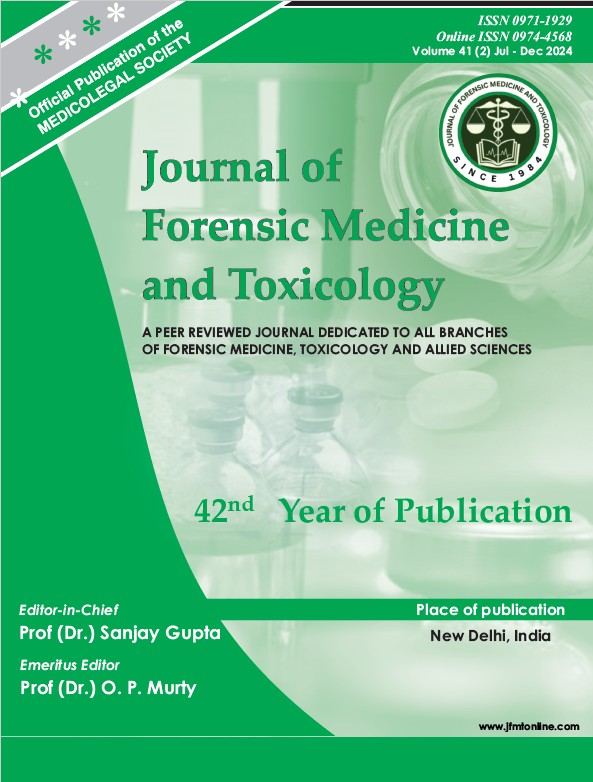Filicide: A Case Series Study of eight cases on Medicolegal Profile and Circumstances
DOI:
https://doi.org/10.48165/jfmt.2025.42.3.19Keywords:
Filicide, Mental disturbance, Spousal revenge, AwarenessAbstract
Background: Filicide, the murder of a child by a parent is a complex phenomenon. It has various characteristics and causes. Even though rare, the outcome of filicide is more pronounced and long lasting compared to other types of murders. Maternal and paternal filicides are deaths of children when the killer/perpetrator is the mother and father of the victim. Material and Methods: This article presents 8 cases of filicide where the parents killed the children. These cases were studied from the postmortem records during the past five years, i.e., from 2020-2024. Results: Most of the cases were maternal filicides. The age of the victims ranged from newborns to adolescents. Mothers usually prefer soft methods of homicide whereas fathers prefer hard methods of homicide. Conclusion: A better understanding and knowledge of potentially fatal paternal/ familial dynamics, methods espoused for filicide could facilitate the identification of risk and enable effective intervention strategies. This case series highlights pattern of filicides in Kadapa region in order to enlighten the health professionals, clinicians and the general population about the importance of early identification of possible risk factors and filicidal tendencies.
Downloads
References
UNODC. Global Study on Homicide. Vienna, 2019. Last accessed on 19/05/2025. Available from: https://www.unilibrary.org/content/books/9789210025713
Crime in India. National Crime Record Bureau, New Delhi, 2022; pg. 192–193.
Bourget D, Grace J, Whitehurst L. A review of maternal and paternal filicide. J Am Acad Psychiatry Law Online. 2006;35:74–82.
D’Orban PT. Women who kill their children. Br J Psychiatry. 1979;134:560–571.
Palermo GB. Murderous Parents. Int J Offender Ther Comp Criminol. 2002;46(2):123–143.
Resnick PJ. Child murder by parents: A psychiatric review of filicide. Am J Psychiatry. 1969;126:73–82.
Bourget D, Bradford JMW. Homicidal parents. Can J Psychiatry. 1990;35:233–238.
Stanton J, Simpson A. Filicide: A review. Int J Law Psychiatry. 2002;25:1–14.
Kauppi A, Kumpulainen K, Karkola K, Vanamo T, Merikanto J. Maternal and paternal filicides: A retrospective review of filicides in Finland. J Am Acad Psychiatry Law. 2010;38:229–238.
Putkonen H, Amon S, Eronen M, Klier CM, Almiron MP, Cederwall JY, et al. Gender differences in filicide offense characteristics – A comprehensive register-based study of child murder in two European countries. Child Abuse Negl. 2011;35:319–328.
Dekel B, Abrahams N, Andipatin M. Exploring adverse parent-child relationships from the perspective of convicted child murderers: A South African qualitative study. PLoS One. 2018;13:e0196772.
Moen MC, Shon P. Attempted and completed parricides in South Africa, 1990–2019. Int J Offender Ther Comp Criminol. 2021;65(9):1097–1117.
Marleau JD, Poulin B, Webanck T, Roy R, Laporte L. Paternal filicide: A study of 10 men. Can J Psychiatry. 1999;44:57–63.
Neha S, Phanjoubam M. Filicide in Northeast India: A study of 10 cases. J Med Soc. 2023;37:31–34.




